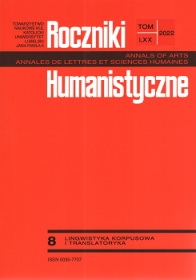Definitional Statements in Context: The Perspective from Translation Studies
Abstract
This paper focuses on definitional statements, and more broadly on explanatory statements, present in published texts. The author deals with the structural dimension of the definitional statement – form, scope, span, textual boundaries – and analyse the discursive purpose of the definitional statement from the pragmatic point of view, in order to highlight the writing strategies implemented. In addition, the definitional statement is evaluated in terms of its intratextual documentary contribution and its role in the construction of the meaning of the text. To illustrate her analysis, the author presents examples drawn from recent press articles (2021), based on the consideration that newspapers act as a powerful relay in the evolution of language. The advent of new occurrences of terms and notions justifies the inclusion of definitional statements. Finally, the author draws some useful lessons for the translator from this study, both in the semasiological (understanding) and onomasiological (making understood) phases of the translation process.
References
Auger, Alain. Repérage des énoncés d’intérêt définitoire dans les bases de données textuelles. Thèse de doctorat, Université de Neuchâtel, 1997.
Durieux, Christine. « L’appréhension du sens: approche contextuelle ». Traduction. Approches et Théories, éd. H. Awaiss & H. Hardane, Colloque de l’ETIB, Beyrouth, 1999, pp. 507-525.
Husson, Anne-Charlotte. « Activité définitoire folk et argumentation en contexte polémique », Jugements et définitions : les métalangues polémiques. Corela. 2020, HS-31, pp. 1-17. DOI : 10.4000/corela.11106.
Labatut, François. « Énoncés définitoires et subjectivité dans les débats sur l’évolution du mariage aux États-Unis ». Les Carnets du Cediscor, 14, 2018, pp. 67-76. DOI: 10.4000/cediscor. 1268.
Malaise, Véronique, Pierre Zweigenbaum et Bruno Bachimont. « Repérage et exploitation d’énon¬cés définitoires en corpus pour l’aide à la construction d’ontologie ». TALN 2004, Fès, 2004.
Mela, Augusta, & Mathieu Roche. « Des gloses de mot aux types de textes : un bilan différencié ». LIRMM, Université Montpellier III et Université Montpellier II, 2007, pp. 132-141.
Rebeyrolle, Josette. « Utilisation de contextes définitoires pour l’acquisition de connaissances à partir de textes ». Actes Journées Francophones d’Ingénierie de la Connaissance (IC’2000). IRIT, 2000, pp. 105-114.
Rebeyrolle, Josette, & Ludovic Tanguy. « Repérage automatique de structures linguistiques en corpus : le cas des énoncés définitoires ». Cahiers de Grammaire, 25, 2000, pp. 153-174. (halshs-01322256).
Rebeyrolle, Josette. « Une analyse discursive d’un type de reprise immédiate : la reprise autonymique, dans les énoncés définitoires ». Journal of French Language Studies, 2005, pp. 67-82. (halshs-00420631).
Rey, Alain. « Polysémie du terme définition ». La Définition. Centre d’études du lexique. Larousse, 1990, pp. 13-22.
Riegel, Martin. « Définition directe et indirecte dans le langage ordinaire : les énoncés définitoires copulatifs ». Langue française, 73, 1987, pp. 29-53.
Riegel, Martin. « La définition, acte du langage ordinaire ». La Définition. Centre d’études du lexique. Larousse, 1990, pp. 97-110.
Copyright (c) 2022 Roczniki Humanistyczne

This work is licensed under a Creative Commons Attribution-NonCommercial-NoDerivatives 4.0 International License.





